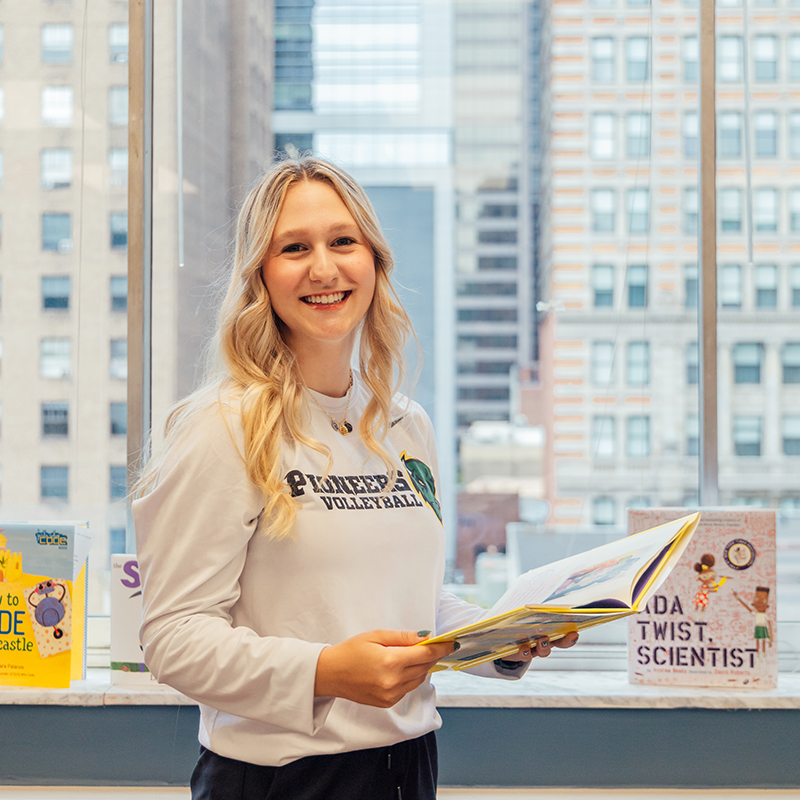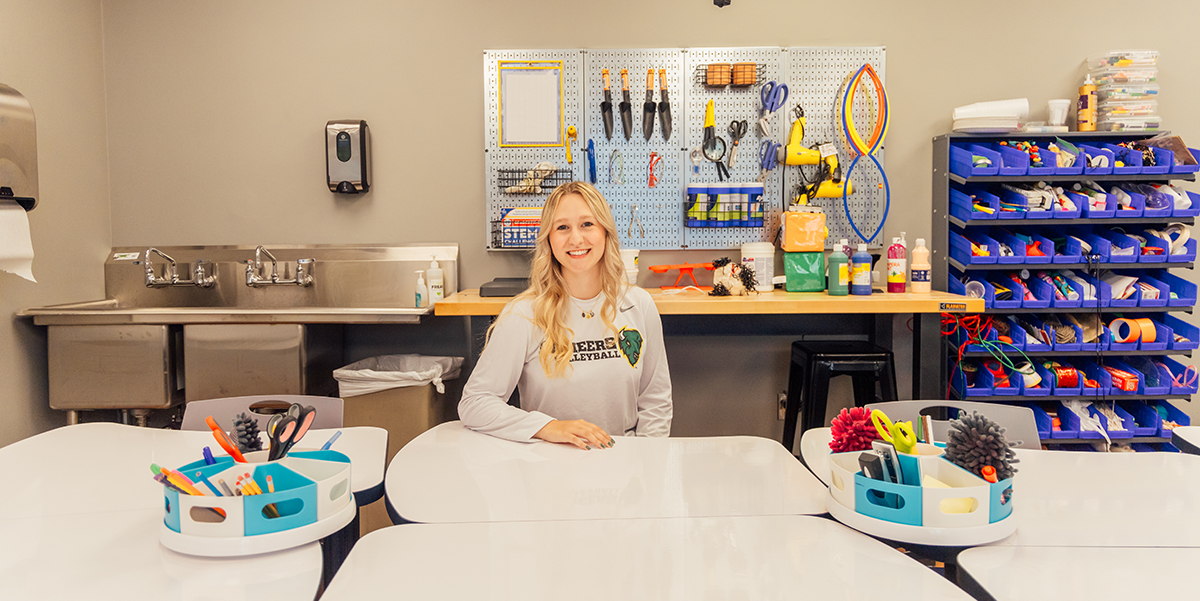Student Q&A: Educational Theories and Practices Course Opens Elementary Education Major Up to a World of Possibilities Student Profile

Photo by Ethan Stoner '26
Meet Lily Marchand '26
- Major/Program
- Education Pre-K – 4th Grade
- Minor
- College Activities
- Point Park Women's Volleyball
- Hometown
- Bethel Park, Pa.
- High School
- Bethel Park High School
- Dream Job
- College volleyball coach, Montessori teacher
"From my first class as a freshman, I was observing in a real-world school, and that experiential learning has continued since then. Being in real classrooms allows education majors to see if teaching is right for them at the start of their college journey."
As Lily Marchand was registering for spring 2024 courses, she noticed the Educational Theories and Practices course with Christal Edmunds, Ph.D., happened to fit into her schedule. She knew it was a required class for her elementary education major but wasn't sure what to expect.
"To say this course has impacted my view of this field is an understatement," she said. "It has completely changed my perspective of teaching in such a positive way."
Marchand and her classmates spent the semester exploring a variety of educational philosophies and seeing them put into practice at local schools that employ those approaches. They visited:
- Mount Lebanon Montessori School and Academy, which uses the Montessori method, nurturing children's creativity and development and allowing them to take ownership of their education through their own interests and activities.
- Carriage House Children's Center, which utilizes the HighScope education approach, a method that incorporates child-initiated and adult-guided learning activities.
- Waldorf School of Pittsburgh, which educates children through the Waldorf method, focusing on engaging the head, heart and hands – or thinking, feeling and doing.
- The Cyert Center for Early Education, which uses the Reggio Emilia approach, emphasizing children's potential and experiential learning.
The combination of on-campus and experiential learning made for an eye-opening experience that broadened Marchand's horizons and clarified her passion for the profession.
"Before this course, I had never heard of Montessori, HighScope, Waldorf or Reggio Emilia education," she said. "This class has changed my outlook for the better. I do not think the same about teaching as I did back in January."
Dr. Edmunds frames the class as a journey. There are no tests, and there is no single right answer to the questions they explore. Instead, students are encouraged to discover which philosophies, theories and perspectives speak to them as aspiring educators.
"By the end of the semester, our students are able to articulate their beliefs about their role as a teacher in their future classroom, the role of the learner and the role of the educational environment," Dr. Edmunds said. "They are always grateful to have had the opportunity to explore so many different perspectives and have the opportunity to see so many different types of learning environments. It's an amazing transformation for me to witness – one of my greatest joys at Point Park!"
In the Q&A below, learn more about the course from Marchand and how Point Park's School of Education is helping her to become career-ready.
Describe the coursework and activities in Educational Theories and Practices.
At the beginning of the semester, we dug into the history of teaching methods, studying some of the forgotten but influential figures of education and their philosophies. We also read a different book every two weeks about an educator's views on teaching, which were all very different and insightful.
When we didn't have a book assignment, we traveled to local schools to see the methods we were learning about in practice. We received a tour of each school from teachers and/or directors, and they talked to us about the educational philosophy they practice and the school itself. The best part was we had time to ask them a ton of questions. The following week, we discussed our thoughts on the book we read and the school we visited, reflecting on each visit and applying course concepts to what we observed. We reviewed three main points of each school: the role of the teacher, child and environment.
This was a small, intimate class, which benefited our learning. We could speak honestly and openly about our thoughts, likes, dislikes, agreements and disagreements about the methods we were exploring. It didn’t even feel like a class; it was just so engaging to sit and talk about what we thought, ask questions and compare points of view. There was also an impromptu opportunity where we got to judge a science fair at a local elementary school. That was pretty cool!
How did this course impact your view of teaching?
Before this course, I thought that my path was going to be working in a public school system, but now I know so much more about the different types of educational institutions that exist. This class has opened my eyes to a whole new world of teaching and education, and now I know there is a greater range of possibilities for my career. The philosophies we studied simply make sense to me. There is more to learning than worksheets, textbooks and lectures. Whether I end up at a public or private school, I can integrate everything I have learned this semester into any classroom setting.

What were some of your key takeaways from the course?
- Lessons and activities should be developmentally appropriate for your students. When they feel connected to what you're teaching, this will help foster their love of learning!
- Choose life every day when you walk into the classroom. This comes from one of the books we read, "Still Teaching in the Key of Life," by Mimi Chenfeld. Don't let your bad day affect your students. Leave your outside life or whatever you’re going through at the door. Choose life.
- Also from Mimi's book, don't make a mountain out of an ant hill. Know when to just let things go and recognize when it's not worth fighting over or making a scene.
- Take opportunities when they arise. Don't stick to such a strict schedule or lesson plan. Create teaching opportunities out of life itself.
- Children's attention spans aren't as small as we might believe. Engage them.
Describe a memorable moment from this course.
I had a memorable moment after we visited Mt. Lebanon Montessori School and Academy. I could have stayed there for hours and asked so many more questions. When we came back to campus to talk about it, we all agreed that if we had gone to a Montessori school as children, we probably wouldn’t have disliked math as much, or we would have understood it so much better. We all felt like the Montessori school sets students up for the best possible outcomes in their education. I just loved that school and their philosophy, the individual learning that takes place and the positive results of Montessori teaching. Something about that approach clicked with me this semester, and now I am almost 100% sure that I want to teach in a Montessori school someday.
What makes Point Park’s approach to training teachers distinctive?
I will never stop raving about how much I love the elementary education program and School of Education at Point Park. From my first class as a freshman, I was observing in a real-world school, and that experiential learning has continued since then. Being in real classrooms allows education majors to see if teaching is right for them at the start of their college journey. In every class, I've learned something I will take with me as a future teacher.
I also love the aspect of inclusivity in the School of Education. Their degree programs teach students how to be culturally responsive teachers, work with English language learners, include special education students in mainstream classrooms and so much more. Additionally, you get to learn from the experience and expertise of the faculty and staff, who are always willing to help and go above and beyond to understand and meet your needs. Point Park covers all the bases and provides opportunities you wouldn’t get at other schools.
Learn more about the School of Education:
- School of Education Honors Graduates with Joyful End-of-Year Celebrations
- With Two On-Campus Maker Spaces, Point Park University's School of Education Builds Meaningful Classroom Experiences
- Education Majors Studying Special Education Gain Hands-On Travel Instruction Experience Through Partnership with the Pathfinder School
More About: faculty, School of Education, student trips, special education, education, student athletes, elementary education, athletics, success story

